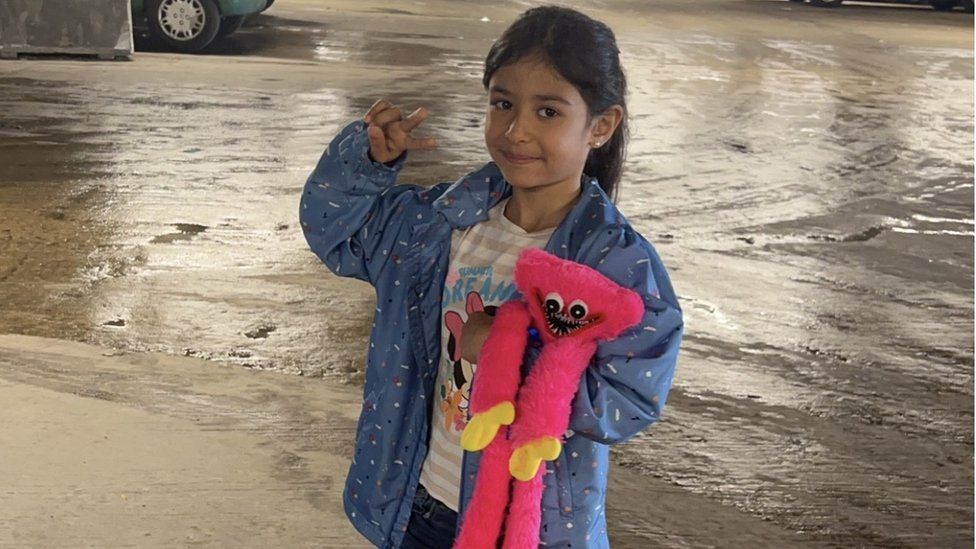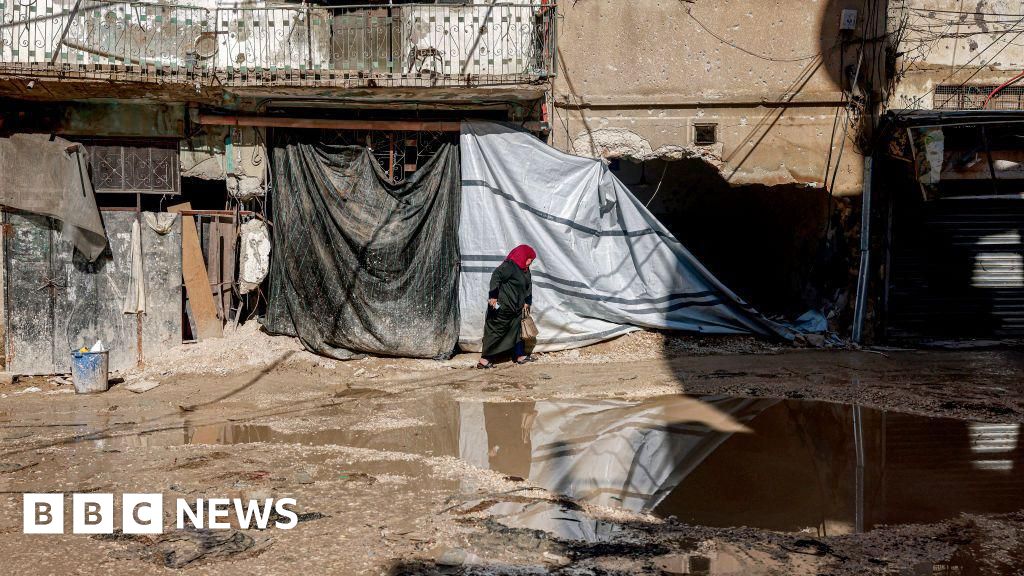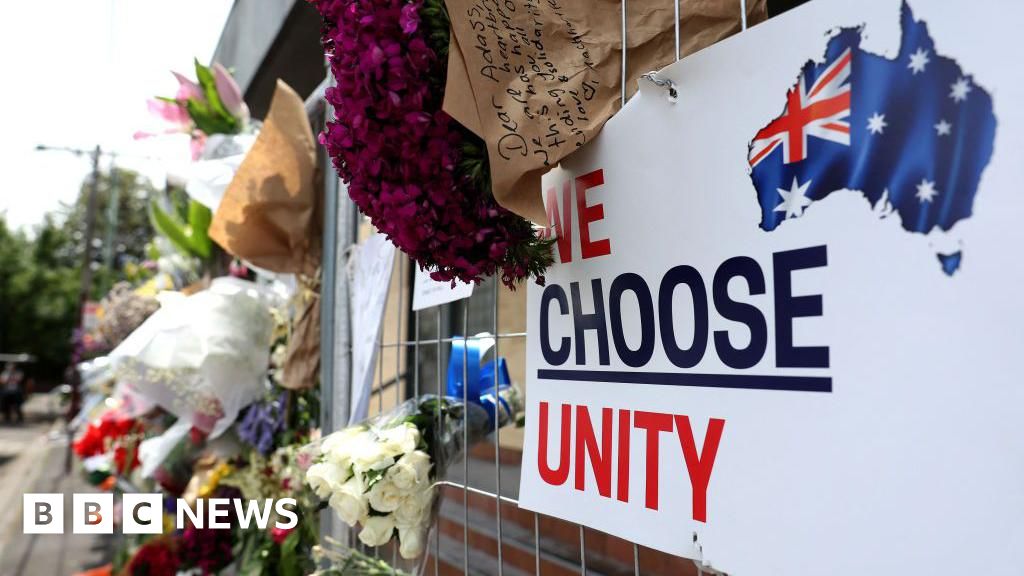ARTICLE AD BOX

Seven-year-old Sara suffocated as people pushed on to a boat heading across the English Channel
By Andrew Harding
Paris correspondent, Calais
Ahmed Alhashimi stood on the beach, howling at the retreating waves, beating and clawing at his own chest, and surrendering to the grief and rage and guilt that would not go away.
"I could not protect her. I will never forgive myself. But the sea was the only choice I had," he sobbed.
A week earlier, before dawn, on the same stretch of French coastline south of Calais, the 41-year-old had found himself wedged tightly inside an inflatable boat, screaming for help, lashing out at the bodies around him, begging people to move, to give him space, to let him reach down and rescue his seven-year-old daughter, Sara, from the suffocating darkness into which she'd been crushed.
"I just wanted him to move so I could pull my baby up," Ahmed explained, of the young Sudanese man who had been part of a larger group that had crowded on board at the last moment, as the boat had drifted away from the shore. But the man had first ignored him, then threatened him.
Watch: Andrew Harding returns to the beach where five migrants died - and many more will attempt crossing
"That time was like death itself. We saw people dying. I saw how those men were behaving. They didn't care whom they were stepping on - a child, or someone's head, young or old. People started to suffocate," said Ahmed, bitterly.
Although Ahmed is an Iraqi, his daughter had never even visited the country. She was born in Belgium and had spent most of her short life in Sweden.
In all, five people died in the same incident, victims of what must have felt like an agonising, slow-motion stampede.
I'd been on the beach at the time with a BBC crew and had filmed the chaos as the smugglers, escorting their passengers across the beach towards a small boat, had used fireworks and wielded sticks to ward off a group of French police who'd attempted, and failed, to stop the group from boarding.
Image source, BBC News
Image caption,The overcrowded inflatable boat heads out to sea in the English Channel
As the boat had drifted further out to sea, we'd heard someone shouting, faintly, from on board. But in the pre-dawn gloom it was impossible to tell what was happening. As dawn broke, the police were already moving away from the shore along with one suspected smuggler and some of the migrants who had failed to clamber aboard.
Ahmed later confirmed that the man shouting for help was him, desperately imploring those around him to save Sara's life. Ahmed's wife, Nour AlSaeed, and their two other children, 13-year-old Rahaf and eight-year-old Hussam, were also trapped in the boat, but still able to breathe.
"I'm a construction worker. I'm strong. But I couldn't pull my leg out. No wonder my little girl couldn't either. She was under our feet," said Ahmed.
Sara (right) with her brother, Hussam, and sister, Rahaf. They had already attempted to cross the Channel three times
This had been the family's fourth attempt at a crossing since they'd arrived in the area two months earlier. Twice the police had caught them on the beach as they'd struggled to keep up with the other migrants sprinting towards a smuggler's boat. Ahmed said this time the smugglers - who charged 1,500 euros (£1,280) per adult, and half that for each child - had promised him that only 40 people, mostly Iraqis, would get on their boat, but that they'd been surprised when a separate group of Sudanese migrants had appeared on the beach and insisted on piling aboard.
Sara had been calm at first, holding her father's hand as they'd walked from the train station in Wimereux the evening before. They had then hidden in the dunes north of town overnight. Sometime before 0600, the group had inflated their boat and then the smugglers had ordered them to carry it down on to the beach and run with it towards the sea before the police intercepted them.
Suddenly, Ahmed said, a police tear gas canister had exploded near them, and Sara had begun screaming. Once they'd clambered on to the boat, Ahmed had kept Sara on his shoulders for a minute or so but had then taken her down in order to help his other daughter, Rahaf, to get on board, which is when he lost sight of Sara.
It was only later, when French rescuers reached them out at sea and offloaded some of the more than 100 people crammed on the boat, that Ahmed was finally able to reach his daughter's body.
"I saw her head in the corner of the boat. She was all blue. She was dead when we pulled her out. She wasn't breathing," he explained, between sobs.
Ahmed and his family had attempted to settle in the EU for many years, to no avail
In the days since then, the family have been looked after by the French authorities, while they wait to bury Sara's body. Ahmed said he was aware that he's faced strong criticism on social media from people accusing him of putting his family at unnecessary risk. He appears torn between accepting and rejecting such blame.
"I will never forgive myself. But the sea was the only choice I had. Everything that happened was against my will. I ran out of options. People blame me and say, 'How could I risk my daughters?' But I've spent 14 years in Europe and have been rejected," said Ahmed, detailing years of failed attempts to secure residency in the EU after he'd fled Iraq following what he described as threats from militia groups there.
Belgium reportedly denied him asylum by arguing that Basra, his hometown in Iraq, was classified as a safe area. He said his children spent the last seven years staying with a relative in Sweden, but that he was recently informed that they would be deported, with him, to Iraq.
"If I knew there was a 1% chance that I could keep the kids in Belgium or France or Sweden or Finland I would keep them there. All I wanted was for my kids to go to school. I didn't want any assistance. My wife and I can work. I just wanted to protect them and their childhoods and their dignity," he continued.
"If people were in my place, what would they do? Those who (criticise me) haven't suffered what I've suffered. This was my last option," he said, appealing to the British government for sympathy and support.
Sara's last picture of her family before they made their fourth attempt to reach England
Eva Jonsson, Sara's teacher in Uddevalla, Sweden, described the seven-year-old as "kind and nice", in a video message sent to the BBC.
"She had a lot of friends in the school. They played together all the time… In February we heard she would be deported and that it would happen quickly. We had two days' notice," she said.
After learning of her death, the class gathered in a circle and held a minute's silence.
"It's very unfortunate that it happens to such a nice family. I have taught [other] children in that family, and I was really shocked about the deportation," said the teacher.
"We have Sara's picture in front of us still, and we will keep it there as long as the children want."

 8 months ago
60
8 months ago
60








 English (US) ·
English (US) ·